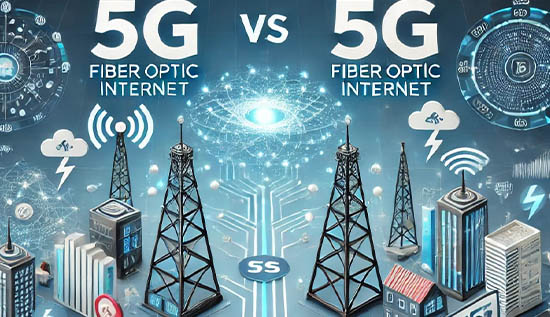5G vs. Fiber Optic Internet: Pros & Cons for Connectivity

Discover the key differences between 5G vs. fiber optic internet to find the best internet for businesses and homes.
Both personal and business use of today's fast-paced digital environment depend on a consistent and high-speed internet connection. Many people are left wondering whether of 5G vs. fiber optic internet is better given their continuous argument. Particularly companies require a business internet solutions that offers dependability, speed and efficiency to satisfy their needs.
The choice between wireless internet vs. wired connection depends on various factors, including speed, reliability, scalability, and cost. While both technologies offer numerous advantages, they also come with their own limitations. This article will explore the pros and cons of 5G vs. fiber optic internet, helping you determine the best internet for businesses and homes.
Understanding 5G vs. fiber optic internet
For understanding 5G vs. fiber optic internet, 5G internet provides high-speed wireless connectivity through cellular networks, making it ideal for mobility and broader coverage. In contrast, fiber optic internet delivers ultra-fast, reliable speeds via wired connections, ensuring superior stability and bandwidth for homes and businesses. While fiber excels in consistency, 5G offers flexibility, making each technology suited for different usage needs.
Benefits of 5G Business Internet:
- Supports Multiple Devices: Perfect for smart offices and IoT-based companies since can manage several linked devices at once.
- Low Latency: Improves real-time applications for greater efficiency including cloud computing and video conferences.
Challenges of 5G Business Internet:
- Limited Network Coverage: Requires more small cell towers due to shorter signal travel distances compared to 4G.
- Signal Interference: Buildings, weather conditions, and obstacles can weaken signals, making it less reliable in some areas than fiber optic networks.
Explore job here: Fiber Optic
Fiber Optic Internet: A Powerful Contender
When comparing fiber optic vs. 5G speed comparison, fiber optic remains the most stable and fastest option available. Using ultra-thin glass or plastic fibers, fiber optic technology sends data using light signal, therefore guaranteeing almost zero latency and minimum loss of data.
The fiber optic network advantages are numerous. It offers unparalleled high bandwidth, speed, and increased resistance to outside interference. This is thus the advised decision for data-intensive sectors including media production firms, software corporations and financial institutions. Unlike 5G, fiber provides symmetric speeds, hence upload and download rates remain constant. This is essential for massive file transfers, cloud storage, and video conferences.
However, fiber optic installation can be costly and time-consuming, especially in remote areas were laying down the infrastructure is challenging. The cost factor often leads businesses to weigh their options between choosing the right internet for business, considering whether they need speed, reliability, or affordability.
Fiber Optic vs. 5G Speed Comparison
When analyzing the fiber optic vs. 5G speed comparison, both technologies deliver impressive performance, but they serve different needs. The primary question businesses ask is, is 5G faster than fiber optic internet for businesses? While 5G can reach gigabit speeds, it often struggles with maintaining consistency. Fiber, on the other hand, ensures stable and uninterrupted connections.
- Download & Upload Speeds: Fiber delivers speeds up to 10 Gbps with equal upload and download rates, while 5G offers fast download speeds but slower uploads.
- Latency: Fiber’s latency is nearly zero, whereas 5G, although fast, still experiences minor delays.
- Reliability: The question of which internet is more reliable: 5G or fiber? is answered by fiber, as it is unaffected by weather conditions and network congestion.
- Scalability: Fiber allows businesses to expand their network without compromising speed, while 5G is limited by coverage and interference.
Choosing the Right Internet for Business
Businesses evaluating high-speed internet options for businesses must take several factors into account. Here are some main points of choosing the right internet for Business:
- Location and Infrastructure: While businesses in developed locations with fiber infrastructure should choose fiber optic internet, urban areas may gain from 5G business internet benefits.
- Usage Requirements: Choose fiber for dependability whether your company depends on big data transfers also video streaming or cloud computing.
- Cost Considerations: Fiber demands hefty installation expenses even if it offers long-term reliability. Although 5G is a more reasonably priced substitute for better coverage it may need further network extender investment.
Security and Performance: Unlike 5G which might be more prone to security concerns, fibre is regarded as more safe since it does not send data wirelessly therefore lowering the possibility of interception.
Conclusion
When choosing between 5G vs. fiber optic internet, it is crucial to analyze business and personal needs. While 5G business internet benefits include easy deployment and mobility, fiber optic network advantages ensure uninterrupted speed and reliability.
Businesses that require continuous, high-speed internet options for businesses should consider fiber optic internet for companies, whereas those needing flexible, wireless solutions may find 5G a better fit. Evaluating these factors will help in choosing the right internet for business and ensuring efficient, uninterrupted operations.
Frequently Asked Questions
1. Is 5G better than fiber optic for businesses?
It depends on business needs. 5G business internet solutions, while fiber offers great dependability and speed, fast deployment and mobility are more important here.
2. Can 5G replace fiber optic internet?
Although 5G provides amazing speeds, given dependability problems and limited coverage it is unlikely to totally replace fiber.
3. What is the best internet for business?
The best internet for business relies on things like infrastructure also location and use requirement. For fast need, fiber is best; 5G fit flexible configuration.
4. Which internet is more reliable: 5G or fiber?
Unlike 5G, fiber is the more dependable option since environmental factor have no bearing on it.
5. How does fiber optic internet benefit companies?
Fiber optic internet for companies provides consistent speeds, high bandwidth, and greater reliability for data-intensive operations.
6. What are the disadvantages of 5G?
Limited coverage, interference sensitivity, and slower upload speeds than fiber is among the obstacles 5G must overcome.
7. What are the advantages of fiber optic networks?
Fiber optic network advantages include faster speeds, minimal latency, enhanced security, and consistent connectivity, making it the best choice for businesses needing a stable internet connection.
More Articles
 04 Mar 2026
04 Mar 2026
Federated Learning: Privacy-Preserving & Secure AI
Build secure AI models using federated learning and collaborative ML without centralizing sensitive data.
 04 Mar 2026
04 Mar 2026
TinyML in Smart Home Devices: AI, IoT & Edge Automation
TinyML in smart home devices is transforming AI-powered smart home devices with faster processing, improved privacy, and energy-efficient AI for IoT at the edge.
 03 Mar 2026
03 Mar 2026
Human Augmentation Technology: Future Breakthroughs 2026
Discover the future of human augmentation technology in 2026—exploring advanced human augmentation devices, tools, innovations, and breakthroughs shaping the future of human enhancement and technology.
 03 Mar 2026
03 Mar 2026
Top 20 AI Innovations to Watch in 2026
Top AI innovations 2026 featuring the latest AI breakthroughs for businesses and game-changing AI applications to watch.